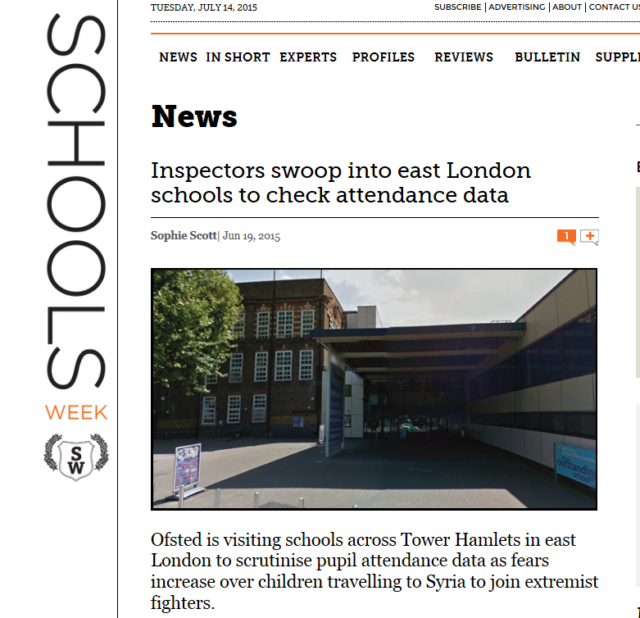Headteachers should be legally required to establish and record the destination of pupils leaving the education system amid fears they could become radicalised, Ofsted has today said.
The education watchdog has called for an “urgent review” into what schools must record about pupils who are deleted from the school admissions registers.
Chief inspector Michael Wilshaw has written to education secretary Nicky Morgan this morning to highlight his concerns.
“It is vital that we have a much more accurate understanding of the whereabouts of children after they are deleted from an admissions register,” he wrote.
Sir Michael urged for a requirement on headteachers to collect and record more detail about onward destinations.
We cannot be sure that some of the children whose destinations are unknown are not being exposed to harm, exploitation or the influence of extremist ideologies
“There should also be a clear requirement for schools to send these details to the local authority on a regular basis and to highlight any cases where they have been unable to obtain the necessary information.
Schools Week revealed last month that Ofsted inspectors had visited schools in Tower Hamlets to scrutinise pupil attendance data after heightened fears that children were travelling to Syria to join extremist fighters.
Inspectors also visited schools in Birmingham and spoke to local authority officials.
Sir Michael said he was made aware of “potentially high numbers of pupils whose names are being deleted from school admission registers, without either the school of local authorities having an accurate understanding of where they have gone”.
“It is an issue which I believe has wider implications for schools and local authorities across the country,” he wrote.
He called for regulations on in-year transfers to be “urgently reviewed and considerably strengthened” to account for risks children face including female genital mutilation, forced marriage, child sexual exploitation and radicalisation.
During the school visits HMI found:
– Inconsistent practices for recording and reporting cases where children are removed from the school
– Poor communication and coordination between schools and local authorities on individual case
– Inadequate systems for identifying and tracking pupils who leave independent schools.
Inspectors said there was no legal duty on schools to establish and record where these pupils go.
Teachers often did not record a destination for pupils, and “in many cases noted generic reasons, for a pupil being removed from the register, such as ‘moved to Libya’, ‘gone to live with grandparents’ or ‘moved abroad’”.

“This makes it very difficult, if not impossible, for schools and local authorities to distinguish the minority of children who may be at risk from the majority who will be safe and receiving a suitable education in mainstream schools, registered independent schools or in their home,” Sir Michael wrote.
“We cannot be sure that some of the children whose destinations are unknown are not being exposed to harm, exploitation or the influence of extremist ideologies.”
A department for educations spokesperson said: “The safety of young people in our schools is paramount and we will be taking immediate steps to strengthen our guidance to schools on safeguarding and to amend the current regulations about the information schools collect when a pupil is taken off the register.
“It is vital local authorities failing in this area take immediate action to establish the identities of children missing education and we are working with them to improve their approach so that children are kept safe from harm.”







The first issue is whether this idea is an understandable, sensible, maybe even necessary precaution or, (for anyone aged 18 at least), an unwarranted extension of state surveillance and invasion of a right to privacy.
The second issue is whether headteachers and LAs have the time, budget or competence to undertake such an activity – which does not seem to have a great deal to do with teaching and learning.
I can see both sides of the argument on the first but on the second, I’m damn sure it’d be an administrative nightmare!